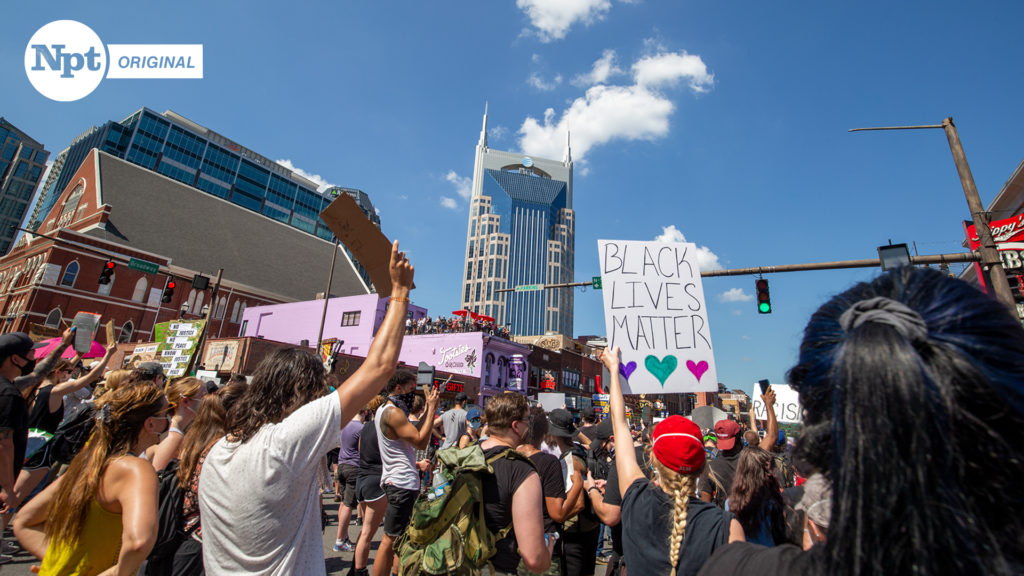
2020 was a year of tumultuous change, forcing Nashville and the rest of the country to reckon with economic and health disparities exposed by the COVID-19 pandemic; the realities of systemic-racial inequality; and ongoing questions of what it means to participate in American democracy. A Time to Heal, the 14th documentary in NPT’s award-winning Next Door Neighbors series, explores each of these areas through the lens of Nashville’s immigrant and refugee communities. WPLN’s Nina Cardona narrates the documentary.
A Time to Heal premieres Thursday, May 27, at 8 p.m. and will be available for online viewing at video.wnpt.org/show/next-door-neighbors. Additional airtimes on NPT are Sunday, May 30, at 6:30 p.m.; Wednesday, June 2, at 12 a.m.; and Monday, June 21, at 12:30 a.m. A Time to Heal will air on NPT2 Monday, May 31, at 8 a.m. and Tuesday, June 1, at 1 p.m.
As shutdowns and other realities of the COVID-19 pandemic began to affect society, it quickly became clear that some communities and segments of the population were being hit harder than others. “We conducted extensive research conversations and showed up at critical events because we knew it would be important to document the historic events of 2020,” said Shawn Anfinson, A Time to Heal’s producer. “At every juncture we found individuals from the immigrant community who were eager to give voice to their personal experiences.”
A Time to Heal outlines factors contributing to the pandemic’s disproportionate effect on immigrant and refugee communities. “First of all, they are essential workers that work in construction, food plants or warehouses where they cannot work remotely. They have to report to work,” Muna Muday, then-CDC foundation associate at the Metro Nashville Public Health Department, says in the documentary.
“And secondly, they live in crowded apartments. So intergenerational households, which makes it very difficult for isolation and quarantine,” Muday continues. “There’s issues of language barriers. There’s issues of access to health care. So all of these things have been a predominant factor in terms of why these populations are very vulnerable with this virus.”
But the pandemic was only one of the issues faced by communities over the past year. A Time to Heal also considers calls for social justice through people like Rwandan refugee Claude Gatabuke, co-founder of Nashville’s Black Lives Matter chapter; as well as Metro Council Member At-Large Zulfat Suara, the first Muslim woman to hold elected office in Tennessee.
“We cannot deal with the issue if we do not acknowledge there’s an issue,” Suara says in A Time to Heal. “And there is an issue here, there’s an issue of inequity – even in the way we protest, even in the way we respond to protests, even in the things that we protest about, even in our feeling that it’s our right to protest.”
The final section of A Time to Heal deals with election participation, running for office and serving one’s community. Naturalized citizens make up 10 percent of the U.S. electorate, according to the Pew Research Center. That’s more than 23 million voters – a number that has nearly doubled since 2000 – and as A Time to Heal shows, those voters are interested in exercising their electoral power.
Daniella Peterson, a newly minted U.S. citizen and a volunteer with the Tennessee Immigrant & Refugee Rights Coalition, also known as TIRRC, in Chattanooga, sums it up this way in the documentary: “I want to be part of my community and I want to be part of the change that we do…. I want to see a city that can prosper for everyone, that everyone has a voice and is heard. So we have to make sure to have officials that can, are able and want to hear us.”
NPT’s Next Door Neighbors: A Time to Heal is made possible by the generous support of the Nissan Foundation.
NPT’s Next Door Neighbors series looks at Nashville’s status as a destination city for refugees and immigrants and explores the rich diversity of people now calling Nashville home. Through documentaries, extensive outreach and continued relationships with Nashville’s immigrant and refugee communities, the Next Door Neighbors project aims to increase understanding of unfamiliar cultures, highlight the experiences and successes of Nashville’s immigrants, and mediate a community-wide conversation about who we are as Nashvillians.
